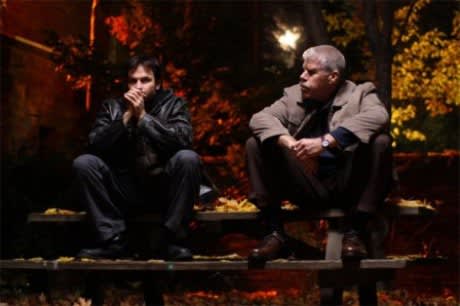There are two moments that crystalize the intent of Charles de Lauzirika's sardonic study of the id-magnifying delusions a man constructs to escape the suffocating inertia of daily life.
Part way through Crave, neurotic protagonist Aiden (Josh Lawson) lets slip a thunderous "Who cares?" in the middle of an amateur theatre presentation, with prominent shots of the laughing and crying avatars of Dionysus cut against looks of embarrassment and disgust spreading across the faces of the audience and performers to hammer home the thematic implications. Later, Aiden's cop buddy Pete (Ron Perlman) relates a piece of concise folk wisdom that speaks to the warring impulses of base desire and conscience. It's basically the idiom, "you are what you eat," as applied to ethics. As a crime scene photographer, Aiden subsists on a diet of violent strutting fantasies, ostensibly to combat his sense of voyeuristic helplessness. But, when driven by genetic imperative, reality is not so noble.
In his Hollywood meme informed imagination, heroics are simply a means to public adoration and sexual conquest. Alpha male posturing attracts mates, and for a man with little identifiable empathy or ambition, getting his dick wet is the end game much as exerting violent dominance over those who annoy and those who don't recognize his "specialness" is an aphrodisiac.
De Lauzirika plays with expectation to handy effect, enacting the scenarios running through Aiden's head and then contrasting them with the mundane inaction of reality. Once structural assumptions are in place, they are immediately tweaked, but not in a way that defies the credulity established by de Lauzirika's systematic fiction shattering.
The film loses some momentum and caustic visceral appeal in the second act when Aiden gets involved with his cute neighbour (satisfaction in real life removes his need to vacation in fabrications). His solace is short-lived, though, and the story resolves in a way that jives well with its frequently funny and sporadically gory journey.
With the intimation that the appeal of vigilantism is a measure of psychosis all people live with but control out of necessity, Crave relates the glorified outsider perspective of Taxi Driver back to the average person who, even if they could mustered the courage, would likely only bungle any attempt to enact the self-serving idealism of fantasy.
(Iron Helmet)Part way through Crave, neurotic protagonist Aiden (Josh Lawson) lets slip a thunderous "Who cares?" in the middle of an amateur theatre presentation, with prominent shots of the laughing and crying avatars of Dionysus cut against looks of embarrassment and disgust spreading across the faces of the audience and performers to hammer home the thematic implications. Later, Aiden's cop buddy Pete (Ron Perlman) relates a piece of concise folk wisdom that speaks to the warring impulses of base desire and conscience. It's basically the idiom, "you are what you eat," as applied to ethics. As a crime scene photographer, Aiden subsists on a diet of violent strutting fantasies, ostensibly to combat his sense of voyeuristic helplessness. But, when driven by genetic imperative, reality is not so noble.
In his Hollywood meme informed imagination, heroics are simply a means to public adoration and sexual conquest. Alpha male posturing attracts mates, and for a man with little identifiable empathy or ambition, getting his dick wet is the end game much as exerting violent dominance over those who annoy and those who don't recognize his "specialness" is an aphrodisiac.
De Lauzirika plays with expectation to handy effect, enacting the scenarios running through Aiden's head and then contrasting them with the mundane inaction of reality. Once structural assumptions are in place, they are immediately tweaked, but not in a way that defies the credulity established by de Lauzirika's systematic fiction shattering.
The film loses some momentum and caustic visceral appeal in the second act when Aiden gets involved with his cute neighbour (satisfaction in real life removes his need to vacation in fabrications). His solace is short-lived, though, and the story resolves in a way that jives well with its frequently funny and sporadically gory journey.
With the intimation that the appeal of vigilantism is a measure of psychosis all people live with but control out of necessity, Crave relates the glorified outsider perspective of Taxi Driver back to the average person who, even if they could mustered the courage, would likely only bungle any attempt to enact the self-serving idealism of fantasy.




